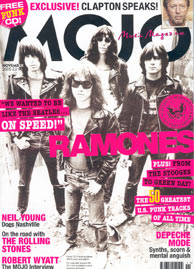| |
|
|
 The
MOJO Interview - Mojo N° 144 - November 2005 The
MOJO Interview - Mojo N° 144 - November 2005
THE MOJO INTERVIEW
Soft
Machine made him miserable. Falling from a window
in 1973 was "a good career move". Enter
the topsy-turvy world of rock's reluctant Mr Nice Guy,
Robert Wyatt.
Interview by MARK PAYTRESS
Portrait by ROSS
HALFIN
|
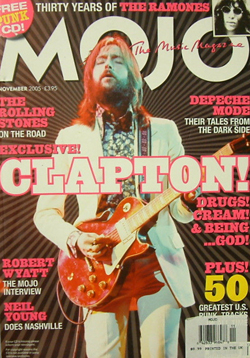
alternative cover
|
ROBERT WYATT IS MAKING HIS WAY TO THE nearest mirror.
"My wife goes mad if it looks crap," he says,
teasing unruly strands of silvery hair away from his face.
It doesn't seem to make much difference. As he poses affably
in his small front garden, oblivious to the bustle of
the Lincolnshire market town passing by his gate, this
softly-spoken god of small things still sports the unkempt
19th century Russian thinker look he's maintained for
over a decade. He's all facial hair and kind, youthful
eyes, and no 10-second makeover can alter that.
Inside, across a wooden dining table, Wyatt discusses
everything that's thrown at him with generosity and insight.
Moving effortlessly from Richard Dawkins to Don Covay,
from father of anarchism Peter Kropotkin to flamenco siren
La Niña de la Puebla over wine, fags and omelette,
Wyatt is fascinated equally by musicians and ideas. Especially
those, such as Hendrix and Miles Davis as well as innumerable
unnamed fighters
for economic and social justice, who push themselves a
bit beyond what we know.
|

|
Wyatt, too, inhabits the realm of
the unthinkable. Less than two years after the singing sticksman
had been unceremoniously dumped by The Soft Machine, on
June 1,1973 he fell from a fourth-floor window ("I'd
always been a bit reckless," he explains) during a
party, which turned his life round for a second time. Left
paralysed and wheelchair-bound, he insists he simply got
on with the job. But when he leaves the room, his wife Alfie
helpfully suggests that "the trick has been denial".
Ostensibly, MOJO is here to discuss the release of Theatre
Royal Drury Lane. This September 1974 set chronicles
his one and only solo live show, including his masterpiece,
Rock Bottom, in its entirety. Since then, he's become
a cherished institution, thanks to a string of inimitable
and idiosyncratic, keyboard-led solo records. Unafraid to
speak up for the common people, Wyatt won the respect of
punk audiences, who loudly applauded his integrity. But
most cherished of all is his voice, the most plaintive,
deeply affecting in popular music. Refreshingly unassuming,
Robert Wyatt is rock's most reluctant legend.
This latest archive release [Theatre Royal, Drury
Lane] was your coming out a year on from the accident
in 1973. Was it difficult to listen to?
No. It's the sound of freedom compared with my previous
responsibilities as a drummer. What I hear are the technical
things, the purely musical things. The content I have to
take for granted.I don't listen like a listener.I would
have loved to have taken that band on the road, though with
Fred Frith, Mike Oldfield and Nick Mason involved, that
was clearly never gonna happen. And John Peel's intro is
one of the best solos on the record. He sets up an atmosphere
that a good MC would have done opening a 19th century music
hall show - very light and easy.
Privately, it must have been a different matter. How
low did you go?
The truth is I wasn't low after the accident. I may have
had the bends coming up too fast, so I may have been a bit
deranged, but I can't call it sadness. I'd just got together
with Alfie. For the first time I had people helping me do
my own tunes. Being rejected by the burgeoning jazz-rock
community [dismissal from The Soft Machine] was far more
humiliating. That was when I was miserable, before I broke
my back, before I met Alfie, before I started a new year
zero in '74. It's actually quite a celebratory moment for
me.
So, contrary to popular opinion, Rock Bottom wasn't a
direct response to your new state?
My overall view of life, not my circumstances, is that I
am rather sad. I think life is wonderful, but my tendency
is towards great sadness about things. I don't know why.
While that may come out, it's not something I consciously
put in. I operate like an animal - I just go for what feels
right. People say humans have a fantastic ability for selective
memory, that they erase pain because a certain amount can't
be lived with. So it may be possible I was more distressed
than I remember. But when you've fallen down a hole, and
are scrambling out, you're not really sad.
|

|
|
|
One night, you're a well-known party animal. The next
you're sobering up in a hospital bed and have just been
told you've lost the use of your legs. What was your first
thought?
I thought it was interesting, odd. It was a bit like being
lifted up by helicopter off a street and dumped on a beach
in Java. You think, Where am I? Is anybody here? I don't
know the language. The world looks the same, but you're
so different in a wheelchair that you have to re-learn how
to live, the oddness of being in the same place but not
being able to participate in the same way. I must emphasise
that I was very unhappy in the late '60s, deeply uncomfortable.
It's not as if I'd lost something that was very precious
to me.
Did you tell yourself: I'm gonna beat this?
No, l'm too short term for that. I thought, Blimey, I think
I might have enough material here for another record - that'll
be good. But I only had about three or four chords I liked.
I wanted to expand the repertoire... to about six.
Where did you look for inspiration ?
Alfie taught me how to look at films in a more educated
way, and though we had a lot of music in common - Sly Stone,
Mingus - she listened to flamenco, Bulgarian folk music
and so on, which had an enormous effect on me. To discover
that the spirit of soul music is all over the world was
a revelation.
From a young age, you'd cherished outsiders through your
admiration of jazz musicians and bohemian culture. Did this
help?
I hadn't thought of it like that, but the answer is yes.
If you're feeling lonely with the world because it seems
to be made for somebody else but not for you, then to find
other people that it's not made for either, who are uncomfortable
in their own ways, you get a certain fraternal sense of
relief from that.
What did music, especially your early passion for jazz,
first mean to you. Escape? Intoxication? Removal from the
humdrum?
You've nailed it!
There's a childlike sense of wonder to your work, and
hints of Christmas carols and nursery rhymes in your melodies.
The first songs I sang were with my dad round the piano
at Christmas - Away In A Manger and Silent Night. It's folk
music, but like a lot of folklore, it survives as children's
music and stories. It's not a deliberate, 'Life is complicated,
I'm going back to my childhood' thing. It's simply that
when you're a child you experience things for the first
time, and a lot of things are astonishing. And it's that
astonishment that's the basis of the art I like. That's
what I try and release when I turn my [creative] tap on.
But you can be made to feel a bit of a fool. I had an LP
once, and the back cover was just a blank blue piece of
shiny cardboard. And I said to the person I was with at
the time, "Isn't this beautiful?" She said, "Not really,
it's just a bit of blue cardboard." That made me feel a
bit sheepish about it. I don't know if that's right or wrong.
Maybe I'm retarded.
|
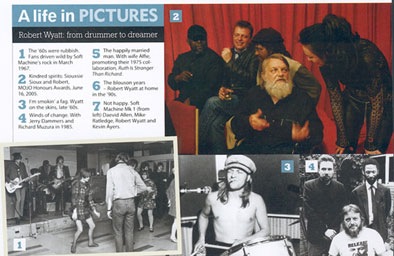
|
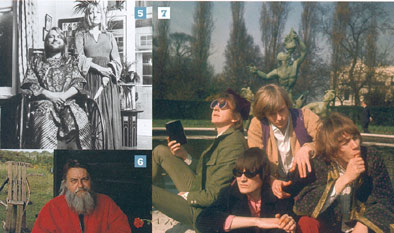
|
Your parents both knew the writer
Robert Graves, were well travelled and seemed to provide
you with an aestheticised world view.
Yes. The only thing that doesn't ring true is that it's
always described as if there was something luxurious about
my upbringing. But my parents were fairly poor and we
lived a fairly scruffy life, as most people did after
the war. It wasn't as grand or precious as the word 'aesthetic'
makes it sound. As far as my dad was concerned, the world
revolved around wine, women and song. If that's aesthetics,
then I'm an aesthete!
I sense you had a smell under your nose when beat music
arrived in 1963.
Beat music was a bit too boy-next-door to get romantic
about. But it was encouraging to think that there was
something I could do. I'd been interested in Eric Dolphy
and Dada and Picasso, and I didn't want to work in an
idiom that closed that off.
In fact, you have a quite jaundiced view of the entire
'60s decade.
There's this surrealist map of the world where they made
some places very big, like Africa. My surrealist calendar
of the 20th century would go straight from 1959 to 1971.
People say that life was so boring in the '50s, and thank
goodness for the '60s. My life wasn't boring in the '5Os.
As a young teenager, the whole business of beats and beatniks,
and the music, these incomprehensible French films, the
berets and the wines and the strange back alleys of Soho
and Paris that went with it, was so exotic and romantic.
I didn't need the breakthrough the '60s provided for others.
You were a significant part of The Soft Machine, an adventurous
pop group doing something unprecedented. Thrilling, surely?
We were just trying to harness the various things that
came into our heads and make something of it. That's all
remember. Only recently when some labels started digging
up old concerts from the late '60s and early '70s, I'd
listen to them and think, Blimey, we weren't half going
at it. It's a relief that it's not always as embarrassing
as I thought it might be, though some of it is. There's
an awful one that should be burned, destroyed, but you
know how perverse people are, they'll go and buy it! It's
like having a tattoo on your arm that you can't get rid
of.
You were with The Soft Machine musicians in various
guises for the best part of a decade. You must have believed
in what you were doing.
It was important for me to be with musicians that might
not normally play together, rather like putting garlic
on cornflakes. The people I played with wouldn't try to
play like somebody else. I liked the idea that what they
played came out of themselves, and was not prompted by
wanting to make, say, a jazz-rock record. I remember thinking
it was better to be original and get it wrong than be
derivative and get it right. It was an adventure to the
point of recklessness.
You're very open in interviews yet always profess near
total amnesia when discussing Soft Machine. Can the collapse
of relationships in a pop group really have been of more
significance to you than the accident?
I once asked Nick Mason why the Pink Floyd keep going.
He said, 'We haven't finished with each other yet."
But we had, obviously. Well, they'd finished with me.
It's silly to talk about a group. It's not a living thing,
just a word to put on a concert bill or a record cover.
I'd rather work the way they do in cinema, where you get
a bunch of people together for a particular project. But
I'm grateful for the discipline and the training that
being in a young group gave me.
|
"Harmless
is as good as I dare aspire to. Beyond that I'm
totally self-indulgent and hedonistic."
|
Your gorgeous, side-long solo epic,
Moon In June, on [Soft Machine's] Third must have suggested
a possible way out.
The only way to play that was for me to do it virtually
myself. The dominant thing in my head was to take responsibility.
I was doing more and more things that were quite incompatible
with the band I was with, that weren't really rock band
things at all. Moon In June was the second of two things
I'd done myself. The first was taking these fragments
of tunes that Hugh Hopper had written which I stitched
together on the second Soft Machine record. The next was
my stitching my own bits and pieces into a sustained sequence
which became Moon In June.
By calling your next band Matching Mole, which roughly
translates as "Soft Machine" in French, was
that a case of not letting go?
It was me saying I was still in that band in my head.
I could have called it Soft Machine. I can now announce
to the public that in fact we were never allowed to register
the name. Anyone can call themselves Soft Machine if they
want a quick shufti to the top of the bill!
How did you cope now you were the boss?
To my dismay, just as I wasn't very good at being told
what do to, neither could I tell other people what to
do. I now think that everything was leading to me making
my own records. But the musicians I worked with were terrific.
Phil [Miller] wrote the tune for God Song. O Caroline
was basically a duet with David Sinclair. But we didn't
have any money or resources. The others took all that.
It was very hard.
The title and cover of Matching Mole's Little Red
Record clearly suggests you'd become politicised by the
early '70s.
The cover was actually chosen by someone at CBS who'd
heard the lyrics, found this poster of the imaginary liberation
of Taiwan, and put our faces on it. However, the world
drifting to the right took me by surprise. I thought the
era of moustached racist colonels in their mock Tudor
houses in Whitstable was becoming a thing of the past,
but to see whole new generations picking up on those ideologies,
that imperial nostalgia, made my skin prickle. I thought
my parents' generation sorted all this. It was quite clear.
Are we on the side of the rich, trying to stay exclusive,
engineering this endless character assassination against
less lucky people? When the guns are firing, there is
no middle ground. My tendency is always to err on the
side of the exploited.
Did the accident make you more militant?
Not directly. I've disappointed some disabled people by
not using my work as a platform to fight for our rights
of access. But if it hasn't caught your imagination, you
can't pretend it has. Yet having to yield control of the
situation you're in, a dilemma most severely disabled
people know well, I can recognise in a lot of the battles
going on in the world.
|
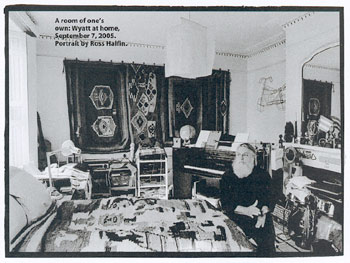
|
|
|
Do you need to be a good man?
I want to be harmless. That's as good as I dare aspire
to. Beyond that, I'm totally self-indulgent and hedonistic.
You're famous for your postcards, written on the back
of cereal packets, sent to friends and admirers. My sister
still has one from the early '80s where you complain about
your nice guy image and sign off as "Bolshie Bertie".
Are you uncomfortable with the Mr Nice reputation?
Sometimes I have to work at a compassionate view towards
what other people have done. I can get very impatient
and angry as an initial reaction. But ideally the goal
would be, to understand all is to forgive all. It's a
magical phrase.
But when a population votes in a government hellbent
on destroying their livelihoods, as in the case of Thatcher,
you must despair.
Well, I'm quite happy to sing a song like Shipbuilding
by Costello, who felt exactly that, a rage that had to
be exorcised in some way. That kind of rage can give you
energy. But it's different from the cool mantle of wisdom
that judges assume, which is almost inevitably bullshit.
It seems to me that a nice person wouldn't have such a
battle with all this stuff.
Earlier on, you mentioned hedonism. Is intoxication
important to you?
I do have an intense greediness for stimuli. I get bored
quickly. But I'm really scared of breaking the law. Pathetic,
isn't it? Some musicians blast themselves with stimuli
in order to blast their own rockets off to go into outer
space. I wouldn't be alive if I were on my own. Alfie's
kept me alive. My ideal state is to do absolutely nothing
in a complete stupor listening to Charlie Mingus records
very loud in a candle-lit room - with Alfie.
So your fall in 1973 saved you?
Yes, that's the way it looks to me. It was a good career
move.
|
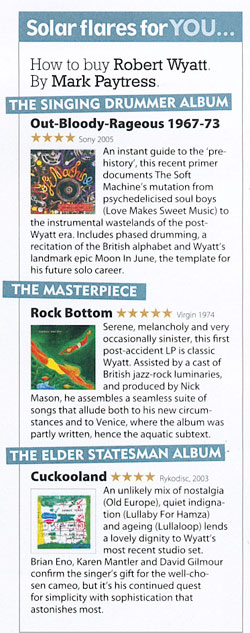
|
Keith Moon apparently taught you how to drink heavily.
What is it with drummers?
I learnt how to get very drunk very quickly with him in
New York. Drummers are hopeless; we don't get our things
together. Maybe because it is extremely physical, it's
possible you get into a certain state, that some chemical
thing happens.
It's obvious that Alfie is your inspiration, your sounding-board,
your collaborator. And, as she says, also "your guarder".
Do you ever yearn to nip out and have a few sneaky beers?
I do. The trouble is it's hurtful for Alfie. If I'm
left to my own devices, I do seem to be amazingly irresponsible,
so I have to be grateful for someone who points these
dangers out in advance. I'm not quite sure how to function
safely in the world. I would be much better for her if
I looked after myself better.
You survived punk. Did you feel a genuine affinity
with it?
Yeah, the working methods, the attitude and the tunings.
It was a very witty movement, an autonomous one that wasn't
invented by fashion stylists. I thought they were very
moral young people. A lot of people were thinking hard
about the rise of the National Front, and the relationship
between young rastas and punks was very ahead of its time.
Some cracking records too.
In the '80s you spent quite a bit of time in Spain
and Italy. Then you moved from west London to Lincolnshire.
Is this indicative of a make-the-world-go-away philosophy?
We had a busy life abroad, recording, doing television
and attending ANC meetings. I didn't need to be part of
the rock world back here. But sometimes a certain distance
is required. If you create a comfortable distance between
yourself and the world you have to deal with, you can
keep control of your own bit of it. But if I'm asked my
ethnic group, I always say "Soho". In my heart I'm still
hanging round Ronnie Scott's foyer. I could spend the
rest of my life there, and I do in my head, just by choosing
the right records.
Over the past 20 years, you've released a record roughly
once every five years. The curse of perfectionism, perhaps?
I'd love to be a perfectionist. I always think I am until
I hear the results, then I realise I'm not.
Cuckooland, the title of your last album is such
a Wyatt word, vaguely archaic, full of echoes.
I'm really amused by words that have some sort of folk
memory, and I love half making up words, because that's
how they came to be in the first place. Cuckooland is
ambiguous. Either the world is really as mad as it looks
to me, or because that's how my brain is, it's me that's
in Cuckooland.
John Peel was a long-time friend. How did his death
affect you?
Terrible. A death in the family. I was asked at the time
to respond in the media and I couldn't. Me and Alfie,
John and Sheila, and John and Helen Walters became friends
over the years quite apart from the professional connection
that brought us together. Sheila is putting together a
CD for the anniversary of his death. I was asked yesterday
if they can have Shipbuilding for it, and as far as I'm
concerned, Sheila can have anything of mine she likes.
The world seems to be filling up with so many friendly
ghosts. As long as you have people in your head, that's
the nearest thing I understand to immortality. People
live on through the people who loved or remember them.
So death is not something you worry about.
Not at all. It is difficult for the people that are left.
The people who are dead are at peace.
|

